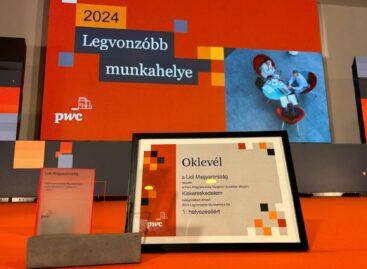PwC’s CEO Survey: Hungarian CEOs expect a quick rebound
PwC Hungary has surveyed the expectations of Hungarian CEOs every year for the past ten years. Since the beginning of our survey, optimism has never been higher about the rate of global and Hungarian economic growth. In 2021, half of the respondents expect an increase in headcount. However, the pandemic has deepened concerns business leaders already had. While the percentage of CEOs concerned about a higher tax burden has increased to 50% (up from 21% last year), crisis preparedness, the deteriorating health of the workforce and the spread of misinformation also rank much higher on CEOs’ list of concerns.
Optimism on the horizon
This is the tenth year that PwC Hungary has gauged the opinions of Hungarian CEOs. This year we had 240 respondents. According to the survey, 65% of CEOs think that the growth of both the global and Hungarian economies will accelerate – our most optimistic outlook to date. This is a huge leap forward compared to last year’s expectations (9% of CEOs were confident about global economic growth, while 16% were confident about Hungarian economic growth). So after the downturn, CEOs expect a rebound now that the end of the pandemic is in sight.
There is no such noticeable shift in CEOs’ confidence about their own prospects for revenue growth. The reason for this could be that since 2015, most CEOs have been steadily optimistic about their 12-month outlook. Companies’ expectations of revenue growth are almost as optimistic this year as they were last year; when looking at the issue over a three-year period, they are even more positive.
Over the past year, staff numbers at large companies did not decline significantly despite the pandemic; only a third of the CEOs interviewed reported that they were forced to reduce their headcount. This suggests that the growth of unemployment at the macroeconomic level is more likely due to layoffs in the SME sector. However, in 2021, half of the CEOs anticipate an increase in headcount once again, and over the next three years, as many as 62% of them expect the same.
Growing concerns
According to PwC’s analysis, CEOs have expected a slowdown in the economy in recent years. The pandemic has put the brakes on economic growth, and the new situation has resulted in new emphases and new ways of thinking. The survey findings show that this change has exacerbated CEOs’ existing concerns about their company’s growth prospects.
For each risk factor, the percentage of respondents who are concerned about that factor has increased by an average of ten percentage points. Pandemics and other health crises have moved to the top spot (82%) on the list of CEOs’ concerns. The pandemic is followed by concerns about the availability of key skills and exchange rate volatility, trailed by uncertain economic growth and cyber threats. It is not surprising that CEOs have factored the top four risks into their strategic risk management activities, in addition to changing consumer behaviour and the speed of technological change.
Some threats show a significant change from last year: the rate of respondents who are concerned about an increasing tax burden has increased by nearly 30 percentage points, with half of the CEOs expressing concerns about rising taxes used as a source of funding for economic recovery. Other risks include the level of crisis preparedness, the deteriorating health of the workforce, and the spread of misinformation. The rate of respondents concerned about each of these three factors has increased by approximately 25 percentage points.
Redefining strategy: digital acceleration
Companies’ growth plans did not change much in 2020: the most common activity CEOs are planning is still improving operational efficiencies (although to a lesser extent than the year before), followed by launching a new product or service, and organic growth. Meanwhile, the percentage of respondents planning a new strategic alliance or a collaboration with entrepreneurs or startups has further declined. The importance of foreign markets has also declined structurally when it comes to growth plans.
“Companies are redefining their strategy: half of the CEOs plan to change their organisational goals in response to the COVID-19 crisis. Those who make changes are primarily aiming to make their company future-proof and sustainable, and are more intent on returning to the new normal. More than three-quarters of Hungarian CEOs plan to spend more on digital transformation, and 77% are investing in initiatives to realise cost efficiencies. It is not good news, however, that CEOs’ focus on foreign markets has decreased. In addition to digital transformation, export is the best route to success,” said Tamás Lőcsei, PwC Hungary’s CEO.
When asked about which changes resulting from the crisis will have the greatest long-term impact on their industry, CEOs responses centred around online presence, automation, and technological advancement. Six out of ten CEOs are planning to invest in R&D and new product innovation, and the same percentage want to invest more in cybersecurity. Over half of the companies want to increase their investment in leadership and talent development, and nearly 50% plan to invest more in environmental, social and governance (ESG) initiatives.
Focus on the workforce
While a third of the companies were forced to reduce their headcount in 2020, this reduction is planned to be only temporary. However, the new ways of operating have also led to new expectations of employees. According to CEOs, the primary factors that contribute to competitiveness are organisational culture, internal communication, and the engagement, adaptability and well-being of employees. They intend to achieve efficiency gains through automation and the use of technology.
“Overall, the pandemic has made the human factor uncertain for businesses. We are facing the twin challenges of skills shortages and unemployment. The strategic importance of the workforce is well illustrated by the fact that the top two factors on the list of priorities for successful business operation are related to employees,” Tamás Lőcsei added.
The fallout of COVID-19
According to Barbara Koncz, partner at PwC Hungary’s Tax and Legal Services, the survey shows that more than a third (38%) of the companies have not been adversely affected by the pandemic. Most of the companies negatively impacted by the pandemic expect their performance to return to pre-COVID levels by 2022. So CEOs are hoping for a quick rebound.
“In terms of GDP and turnover, most CEOs believe that the economic slump bottomed out in 2020, and they expect a quick recovery in 2021. Overall, CEOs seem to consider the impact of the COVID-19 crisis to be temporary, and the key to tackling it lies in a skilled and healthy workforce, digitisation and factoring the risks into the corporate strategy,” Barbara Koncz added.
The survey results show that the pandemic has highlighted the importance of digitisation and automation in almost every industry. For example, in the financial sector, 86% of CEOs expect a boom in e-commerce in the next 12 months. At the same time, nearly 70% of respondents anticipate a decline in the demand for access to goods and services in a physical location, and they also expect the use of cash to diminish.
Almost all reported a change in the way they personally work. Even the CEOs of companies whose performance has not been adversely affected by the pandemic are missing something from their pre-COVID lives. Three-quarters of respondents miss forming personal relationships with employees or customers/clients via face-to-face interaction, and the majority also miss the ability to boost employee motivation via in-office collaboration. A third of CEOs miss travelling and ad hoc encounters in the office, while a quarter of them would better understand the concerns of employees or clients via behavioural or physical cues. However, the share of CEOs who miss working from the office is only 8%, according to PwC’s research.
Related news
After a subdued year, the holiday season is strong
74% of online shoppers, around 3.1 million people, are preparing…
Read more >PwC: dramatic steps needed to meet climate targets
According to PwC’s recent Net Zero Economy Index report, the…
Read more >Lidl among retailers and Coca-Cola in the FMCG sector win Most Attractive Employer 2024
For the 8th time PwC Hungary has surveyed labour market preferences and…
Read more >Related news
Most major grocery chains will keep their stores open until noon on December 24th
Most of the large grocery chains will keep their stores…
Read more >Recognition of Consumer Protection Excellence: Honoring the Best of 2024
This year’s outstanding consumer protection officers and special award recipients…
Read more >KSH: industrial production decreased by 0.2 percent in October
In October, the volume of industrial production fell by 0.2…
Read more >






